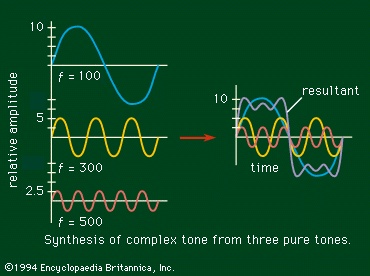timbre
sound
also called timber
quality of auditory sensations produced by the tone of a sound wave.
 The timbre of a sound depends on its wave form, which varies with the number of overtones, or harmonics, that are present, their frequencies, and their relative intensities. The illustration-->
The timbre of a sound depends on its wave form, which varies with the number of overtones, or harmonics, that are present, their frequencies, and their relative intensities. The illustration--> shows the wave form that results when pure tones of frequencies 100, 300, and 500 hertz (cycles per second) and relative amplitudes of 10, 5, and 2.5 are synthesized into a complex tone. At the right is the resultant of the three sine curves when their ordinates are added point by point along the time scale. In equation form, the amplitude y of the wave form at any time t would be represented by y = 10 sin (2π 100t) + 5 sin (2π 300t) + 2.5 sin (2π 500t). The timbre of this form would be recognizable and different from others having a fundamental tone of 100 hertz but a different harmonic amplitude.
shows the wave form that results when pure tones of frequencies 100, 300, and 500 hertz (cycles per second) and relative amplitudes of 10, 5, and 2.5 are synthesized into a complex tone. At the right is the resultant of the three sine curves when their ordinates are added point by point along the time scale. In equation form, the amplitude y of the wave form at any time t would be represented by y = 10 sin (2π 100t) + 5 sin (2π 300t) + 2.5 sin (2π 500t). The timbre of this form would be recognizable and different from others having a fundamental tone of 100 hertz but a different harmonic amplitude.In music timbre is the characteristic tone colour of an instrument (musical instrument) or voice (vocalization), arising from reinforcement by individual singers (singing) or instruments of different harmonics, or overtones (q.v.), of a fundamental pitch. Extremely nasal timbre thus stresses different overtones than mellow timbre. The timbre of the tuning fork and of the stopped diapason organ pipe is clear and pure because the sound they produce is almost without overtones. Timbre is determined by an instrument's shape (e.g., the conical or cylindrical pipe of a wind instrument), by the frequency range within which the instrument can produce overtones, and by the envelope of the instrument's sound. The timbre of spoken vowels or of a singing voice is modified by constricting or opening various parts of the vocal tract, such as the lips, tongue, or throat.
- Twain, Mark
- Twain, Shania
- Twardowski, Samuel
- twayblade
- tweed
- Tweed, Blanche Oelrichs Thomas Barrymore
- Tweeddale, John Hay, 2nd Earl and 1st Marquess of, Earl Of Gifford, Viscount Of Walden, Lord Hay Of Yester
- Tweed River
- Tweed, River
- Tweed, William Magear
- Twelfth Night
- Twelve Patriarchs, Testaments of the
- Twelve Tables, Law of the
- Twelve, The
- Twelve Tribes of Israel
- Twenhofel, William Henry
- Twentieth Century-Fox Film Corporation
- Twentieth Congress of the Communist Party of the Soviet Union
- twenty-five
- Twenty-five Articles of Religion
- Twenty-one Demands
- twenty-six
- twilight glow
- Twilight Saga
- twill